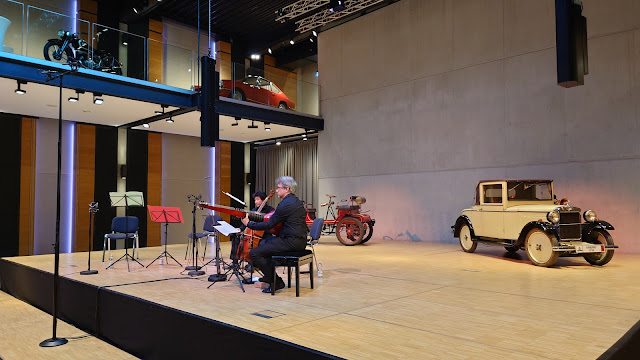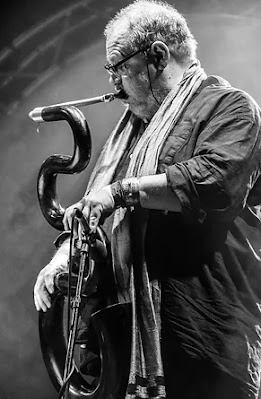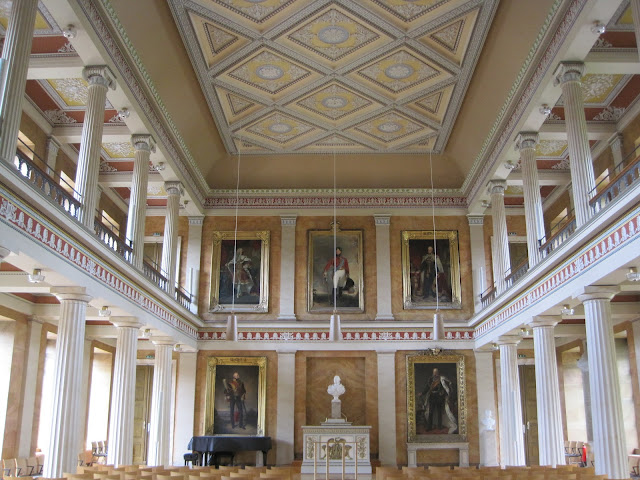 |
| Tales of Apollo and Hercules - London Handel Festival (Photo: Craid Fuller Photography) |
With the 2025 London Handel Festival in full swing, it is presenting a new staged double bill, Tales of Apollo and Hercules.Directed by Tom Guthrie, with David Bates conducting La Nuova Musica, plus New English Ballet Theatre with choreography by Valentino Zucchetti, the evening features dramatisations of two Handel works from opposite ends of his long composing career.
Tales of Apollo and Hercules pairs Handel's Italian secular cantata Apollo e Dafne HWV 122 (1709/10) with the English oratorio The Choice of Hercules HWV 69 (1750) featuring a cast including Dan D’Souza, Lauren Lodge-Campbell, James Hall, Madison Nonoa and Bethany Horak-Hallett.
Here, Tom Guthrie, introduces the programme and considers myths in the modern day.
 |
| Tales of Apollo and Hercules - London Handel Festival (Photo: Craid Fuller Photography) |
"The lover of myth is in a sense a philosopher; for myth is composed of wonders"
Aristotle
"Myth is much more than a story. It is a way of understanding the universe"
Joseph Campbell
"Myth is the most basic way of organizing the world"
Northrop Frye
“The mythologems of the world arise from within us, and hence take on different meanings for every culture and individual”
Carl Jung
"Myth is a healthy and allegorical way one tells the truth to a child"
Carl Kerenyi
 |
| Tales of Apollo and Hercules - London Handel Festival (Photo: Craid Fuller Photography) |
I'm walking to a site visit at Shoreditch Town Hall ahead of a new production for the London Handel Festival. I take a train and on the opposite platform is a dancer. It’s 11am. She’s not dancing. She’s pushing a buggy. I can tell she’s a dancer because of the way she moves, the way she holds herself, her feet. We’re working with fabulous dancers in one of the shows we’re doing in Shoreditch:
Apollo e Dafne, Handel’s early Italian cantata exploring the wonderful transformation myth in which Daphne is pursued and is rescued from capture – and falling into the clutches of her pursuer – by being turned into a tree. As I stand on the platform, I realise I’m looking at a modern day Daphne. A mover, turned static. A body and life transformed, if only temporarily.
Myths are rich, imaginative stories that help us understand how things are. Their meaning changes through life. They're not instruction manuals. They help us, not by explaining, but by presenting and exploring in multi-faceted ways the mysteries of our existence, our relationship with others, ourselves and the world around us. They articulate mysteries about who we are.
As such they’re open to interpretation. They cannot be locked down to one possible meaning. And neither should they be taken as judgements. Apollo and Daphne is a wonderfully clear but at the same time mysterious transformation myth. On many levels Daphne becoming a tree is a terrible punishment. This huntress, this liver of life, chaser of dreams, busy in her days, becomes static, voiceless. There are clear feminist readings of the story. She is robbed of the life that she could have had by the presuming attention of an arrogant man. Sylvia Plath’s extraordinarily moving poem Virgin in a Tree captures this idea with virile passion.
But in many versions of the myth, and certainly in Handel’s, Daphne is not the only one to be transformed. Apollo’s love is, increasingly perhaps, sincere, deep and vulnerable. His final aria, high, demanding, is a universe away from the first two he sings.
And what if we take a more non-literal allegorical view? What is a tree? Daphne is not turned into a stone. She is not snatched down to the underworld, or turned into a bird. Trees are extraordinary. Rooted, giving nutrients, oxygen, shelter, nesting space. Long-living. The placenta is often called the tree of life. It looks like a tree. In some cultures, Mayan for one, placentas are buried under trees. What if this is a myth about the transformation necessary for birth, the huge and unknowable biological and psychological changes that happen in pregnancy, whether with or, in the worst cases, without consent?
The question of consent is central to the myth. So it is also a story about the mystery of agency and choice. What can ever prepare the first-time mother for what happens to her so completely in body and mind. How far are we really in control? What role does genetic biology, chance, and even the universe, have in what control we have over our lives?
Beyond any interpretation that can be discussed here is an overriding point. The important question. What does it mean to you? And, in our work in Shoreditch, what did it mean to Handel? Myths like this are there for us to see ourselves in, and we are all different.
The Choice of Hercules meanwhile, (some might call it at least useful, at best a stroke of programming genius), is about a boy. A special boy. Every child is special. Every child has the potential to affect the world. How do we bring up our children to make the best choices to face the challenges and the tasks that life throws at them in a way which will have a good effect for them and for those they love and those around them?
The ideas of virtue and pleasure are, on the face of it, simple. Should you live for your own pleasure or do you live for the good of the world? In ancient Greek times, as now, there are nuances and subtleties, as there were clearly for Handel too. Pleasure's first aria, with arching melody and longing suspensions, portrays pleasure, rightly, as a deep human emotion. In the 5th century BC, Epicurus gave his name to a philosophy of living that nowadays we associate with words like gluttony, indulgence, selfishness. Epicurus actually espoused a more serious philosophy. Deep pleasure can cost. Quality of life as a philosophical position that is not all about ease.
Meanwhile, virtue does not exclude pleasure. This oratorio written towards the end of Handel's life honours these nuances, these shadows, in profound ways. It makes for a deep and meditative piece of theatre. As with Apollo e Dafne, it embodies and personifies a mystery in a way that allows us to see ourselves, to project, to think, to imagine, perhaps to celebrate.
 |
| Tales of Apollo and Hercules - London Handel Festival (Photo: Craid Fuller Photography) |
If you’re interested in reading more, try:
- Myths for a Post Truth World, Iannis Gabriel
- Soul Mates, Thomas Moore
- Goddesses in Everywoman, Jean Shinoda Bolen
- Gods in Everyman, Jean Shinoda Bolen
- Like A Tree: How Trees, Women and Tree People Can Save The Planet, Jean Shinoda Bolen
- The Choice of Hercules: Pleasure, Duty and the Good Life in the 21st Century, A. C. Grayling
- Exit the Supersensorium, Erik Hoel
Tom Guthrie
Tales of Apollo and Hercules
Shoreditch Town Hall
London Handel Festival
Performances 28 and 29 March - full details from the festival website.
.jpeg)
.jpeg)





















-DavidMonteith-Hodge-Photographisepleasecredit-Alcina2-(DMH_9148).jpg)
-DavidMonteith-Hodge-Photographisepleasecredit-Alcina2-(DMH_9092).jpg)





.jpg)

.jpeg)





.jpeg)